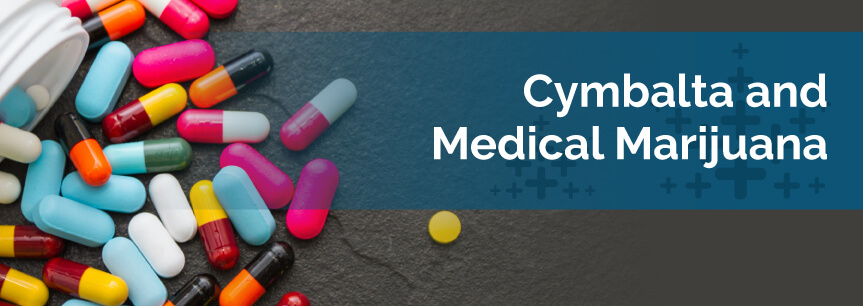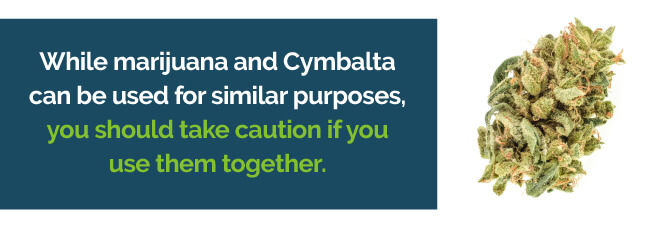
Cymbalta is a drug used for several purposes, including anxiety, depression, and chronic pain—conditions that also appear on many state lists of approved uses for medical marijuana. Patients who have been prescribed Cymbalta may have questions like whether the drug can be taken alongside medical marijuana or whether medical cannabis can serve as a replacement for Cymbalta. In this article, we’ll help you find answers to those questions and more.
Cymbalta, also known as duloxetine, is a serotonin and norepinephrine reuptake inhibitor (SNRI). As the name implies, SNRIs increase the serotonin and norepinephrine in the brain. These chemicals help regulate moods, pain, and other important bodily functions, and Cymbalta helps influence the levels of those chemicals in the brain.
It comes in the form of a capsule that you take with water or another drink. The standard capsule immediately releases the medicine, providing a quick and strong benefit. On the other hand, the delayed-release capsule slowly releases the medicine into your system, producing a milder effect that lasts longer.

Side effects of Cymbalta range from mild to severe. Common and minor side effects include aches, frequent urination, excessive sweating, sleep issues, and weight loss. Rarer side effects include digestive issues and sexual problems.
In certain cases, a patient can experience withdrawal symptoms after abruptly stopping use. Some have to do with muscle control, such as muscle spasms, tremors, coordination problems, overactive reflexes, and loss of bladder control. Others relate to overstimulation, like agitation, restlessness, sleep issues, and uncontrollable excitement. Do not stop taking Cymbalta without first consulting your doctor.
If you use Cymbalta for depression, be aware it may worsen your depression symptoms. If you deal with increased depression when you take it, contact your doctor right away.
Cymbalta can be used to treat health issues such as:
Keep in mind that Cymbalta isn’t suited for every person. People who have certain health conditions, including diabetes, problems with urination, high blood pressure, and liver disease, shouldn’t use it. Research hasn’t definitively concluded whether it can be safely taken by children, the elderly, pregnant women, and those who are breastfeeding, but it generally isn’t recommended for these groups.
While marijuana and Cymbalta can be used for similar purposes, you should use caution if you take them together. Some of their side effects are also similar, meaning they could be magnified if the two substances are combined.

The problems occurring when the two drugs interact tend to be related to cognitive and motor function. Cognitive side effects include concentration problems, confusion, impaired judgment, and difficulty thinking. Motor side effects include impaired coordination and dizziness. These side effects can become even worse when you use alcohol.
Drugs.com classifies the interaction between Cymbalta and marijuana as moderate. According to the site’s guide, doctors should recommend the combination only in special circumstances. If you and your doctor decide that the benefits outweigh the risks and you want to try taking both together, closely monitor your symptoms and stay in touch with your physician.
Marijuana has been shown to provide relief from a wide variety of conditions, including those for which doctors prescribe Cymbalta.
Marijuana may relieve depression symptoms, for example. Research has shown that patients who use medical marijuana experience less depression than patients who don’t use it, although scientists still don’t quite understand what makes cannabis effective at treating mood disorders.
Cannabis can ease anxiety as well. One of the major components of marijuana, cannabidiol (CBD), was found to reduce anxiety in clinical trial subjects. Since marijuana can also heighten anxiety in certain people, monitor your symptoms closely if you medicate with cannabis.
Chronic pain is one of the most common uses of medical marijuana. According to the National Pain Report, 62% of medical marijuana patients said that cannabis relieved their pain very effectively. Meanwhile, 10% of study participants thought Cymbalta was very effective.
Whether or not you choose to use cannabis or Cymbalta is a personal choice that should be between you and your doctor. Both options work for their intended purpose, but every person is different. What works well for someone may not work as well for someone else. Don’t be afraid to test your options and determine which is right for you.
Consider this blog post a primer on Cymbalta and marijuana. As always, medical professionals well-versed in cannabis medicine can answer the other questions you have. Start the search for a trained physician or medical dispensary near you.
No Information on MarijuanaDoctors.Com should be used to diagnose, treat, prevent or cure any disease or condition. You can view our Full Disclaimer here.